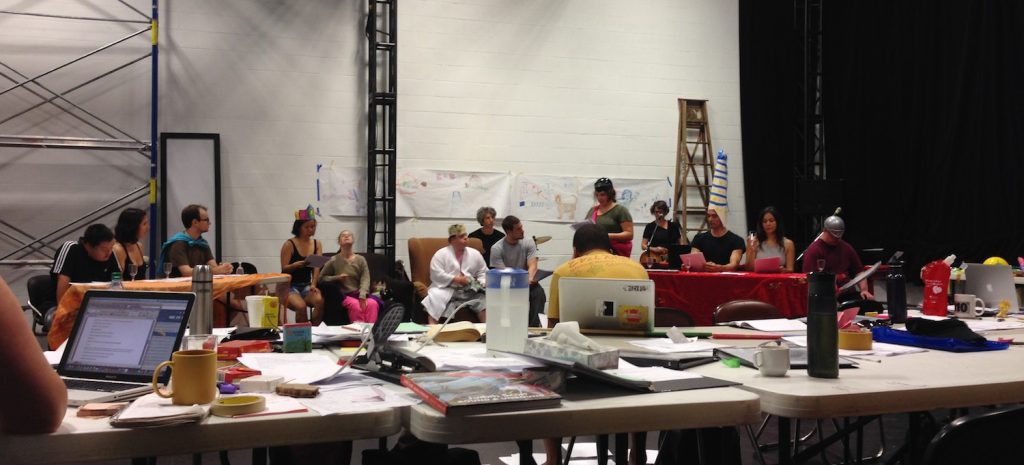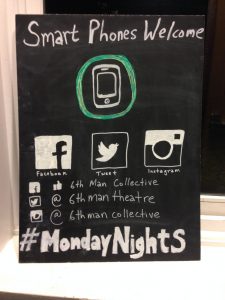
In the past couple of weeks, the interwebs, along with televised, radio and print journalism have all been on fire with stories about badly behaved audience members. It is really weird.
There was even a story in The New York Daily News about actors getting angrier with their audiences. Angrier? So this means they were already angry? Really? Well, yes. There seems to be a lot of rage at audiences these days.
First of all audiences don’t come to the theatre (what the hell is wrong with them?) and when they do they don’t stay (why the hell didn’t they just stay home?) and if they do come they let their phones ring (Is there no intelligence left in this world?) or worse, yet, they text! (I mean don’t they know they are not the centre of the universe?) What a bunch of jerks! Audiences are assholes! Like basically they don’t know how to do anything right anymore. What has happened to civilization?!
Cell phones are such a contentious issue: what bugs me will not bug you. Cell phones bug me sometimes, but they don’t bug me other times. And therein lies the problem:
Theatre – up til now – has been a place of gathering to share rules together. And thanks to the ingenuity of humankind it has also become a space that can control darkness and light. With the advent of electricity, a single hand of god entered our theatres and organized our shared suspension of disbelief. In the theatre it could be daylight outside but nighttime inside. In the theatre a total experience, offering lighting and climate control, largely conditioned by electricity, was created.
This make believe space was a feature of a single perspective that, if hit correctly, could work magic on a massive audience. The experience – therefore – was led by a single author and the followers were invited to ‘read’ their text. That was what one came to expect of the theatre. You went to a place and you received and you behaved.
Until you didn’t. Think about the revolution of electricity in the theatre. It removed the audiences opportunity to share in the unfolding of the story but it gave the author maximum control of how the story unfolded! Suddenly electricity was everywhere. In fact, if you get a chance to see Ann Washburn’s new play 10 out of 12 there is – I think – a really compelling argument about how electricity as it pertains to the well-made play, has systematically aided and abetted in stunting our capacity to communicate.
Huh? How is that possible? Well, elegantly told, we come to understand that the system of telling has beat out the subject it means to support. Formalism has silenced the capacity for content – or culture (as I like to think of it) to emerge. So something new must occur.
Cell phones in the theatre are not the new thing but… they are part of it.
Theatre actually made the news in significant ways in these past few weeks. One story was about young guy, who wanted to plug his phone into an outlet on the stage set for a Broadway production of Hand to God, so that he could keep in touch with his girlfriend(s). He was mocked by news people and weather people alike for a lack of intelligence and culture. Not my impression. In fact the guy had been to the theatre before, and he knowingly made a choice that he understood wasn’t necessarily a ‘right choice’ to make but determined that it wasn’t all that wrong either. He was not lacking in knowledge, he simply did not find the conventional knowledge all that relevant to his needs.
The theatre has been a space to commune with one another on what it means to be human. And herein lies a great part of the tension. We don’t know what it means to be human anymore. Where do I end and where does my cell phone start? This is simplistic but it is not dismissible. Were it to be… we would not stand in wonder when we meet one of the last western holdouts to not own a cell phone. And we would not stand amazed and ask how oh great one who lives among us, how do you do it? How do you get by?

We are our data and we are becoming ever more so with each passing year. Our human condition is changing/has changed. It is not immutable as it was thought to be. And perhaps it never was immutable, but we collectively suspended our disbelief about this. Cell phones are the harbingers. They bring with them the news of change. And as theatre makers, I think the time is always right to respond to change. What can we do to mitigate and generate. How can we celebrate?
1.For conventional theatre lets create Phone Valets who will care for audience members’ phones and accept instructions for what constitutes an emergency that the audience member must be taken out of the theatre to attend to.
2. For alternative but still conventionally steeped theatre lets offer last row cell phone seats where audience members can watch a live stream of the performance (because they are in the last row and far from the stage – think opera glasses for today) and let them simultaneously commune with their interweb neighbours about the experience
3. Make theatre that invites cell phones in. A great example is onstage at The Theatre Centre in Toronto now. #Monday Nights not only encourages cell phone use it also dismantles the single author perch. And not only is it a play but my goodness me, you get to play!
4.Trust the audience. Assholes they are not.









